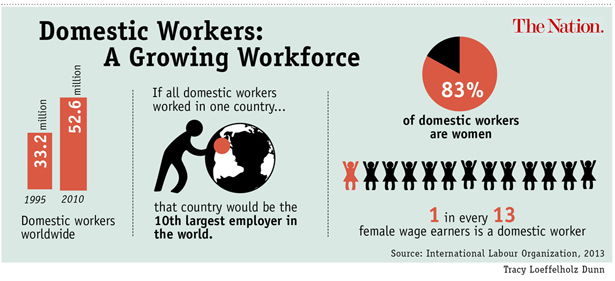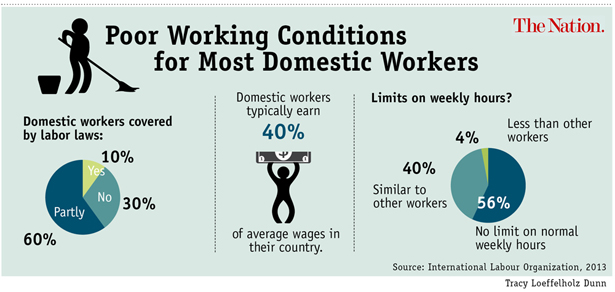The rights of domestic workers may be an important issue in the United States, but we’re far from alone in having growing ranks of workers who suffer from few labor protections and abusive working conditions. A new report out from the ILO yesterday sheds some much-needed light on what the global domestic worker workforce looks like.
Firstly, it’s huge. Just take a look at some of these figures:
The ILO report counts a conservative minimum of at least 52.6 million domestic workers across the globe as of 2010, accounting for just under four percent of all wage employment. It’s also getting bigger: that number nearly doubled since the mid-1990s, increasing by 19 million. The growth isn’t just because of a growing population, either—domestic workers’ share of total employment grew from 1.5 percent to 1.7 percent in the same time period. As the report notes, “If all domestic workers worked in one country, this country would be the tenth largest employer worldwide.” Domesticworkistan would be quite the global economic player. This is just a conservative estimate based on measurable data, however. Given the shadow market that many domestic workers operate in, that number could be as large as 100 million workers.
It may come as no surprise, too, that this workforce is mostly female. Women account for nearly 85 percent of all these workers. In fact, one in every thirteen female wage workers worldwide is a domestic worker. Domesticworkistan would also look a lot like Herland.
But just as domestic workers here at home often don’t enjoy the same labor protections as other workers and often work in low-pay, poor conditions, much of the global domestic worker workforce is left exposed to abuse and poorly remunerated:
A mere 10 percent of these workers have the same labor law protection as other workers. In fact, nearly a third work in countries where they’re completely excluded from labor laws.
It’s unsurprising, then, that these jobs offer little pay and few benefits. The report notes that these workers “typically earn around 40 percent of average wages in their country.” They often have no limit to the hours they work, are rarely entitled to rest periods, don’t make minimum wage and aren’t guaranteed maternity leave. More than half have no upper limit on the normal weekly hours that they are expected to work. Just under half aren’t entitled to any weekly rest period. Just over 40 percent are not entitled to any minimum wage. The percentage who are entitled to the same maternity leave as other workers is a bit more promising—nearly two-thirds work under such conditions. But over 35 percent have no legal entitlement to maternity leave at all, despite such a female-heavy workforce.
Remember that these are just basic protections. This is strenuous work that is also vital to the functioning of our economy—and our lives. The report defines domestic workers broadly, as basically anyone who works in a private household. These are the child care workers, cooks, cleaners and elder care workers who allow others to go to work and know their loved ones are taken care of. It seems it would behoove all countries to pay these workers not just a minimum wage, but a living wage; to give them not only maternity leave, but paid time off; to give them more than twenty-four hours work of break time in a week.
Yet the report notes that adopting better labor practices seems to be slow-going. The organization adopted the Domestic Workers Convention and an accompanying Recommendation in the 100th session of the International Labour Conference in 2011, which are the first international labor standards devoted specifically to domestic workers. Since then, only three countries—Uruguay, the Philippines and Mauritius—have ratified the convention. Bolivia and Nicaragua’s parliaments have approved the convention, as has South Africa’s labor council, and twenty other countries have “initiated ratification procedures or are taking steps in this direction,” it notes. Over time there may be more countries, but I’d be shocked to see the United States end up on that list, given that we’ve also been holding out against the Convention on the Elimination of All Forms of Discrimination Against Women—along with Sudan, Somalia and Iran.
For more on the war on low-income women, read Bryce Covert’s assessment of state-level gender politics.




